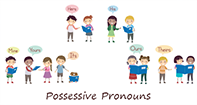Change Avatar
Reflexive Pronouns
Reflexive Pronouns
Reflexive pronouns indicate you’re talking about yourself. They’re used as an object of a verb when it refers to the same noun as the subject. It sounds confusing, but really isn’t.
Sometimes it helps to look at reflexive pronouns by person and number. Check out the following chart:
| Singular | Plural | |
|---|---|---|
| 1st Person | myself | ourselves |
| 2nd Person | yourself | yourselves |
| 3rd Person | itself | themselves |
For information about using gender neutral reflexive pronouns, check out Gender Pronouns.
When Do I Use Reflexive Pronouns?
If the subject and the object within a sentence are the same, then you can use a reflexive pronoun for the object. Sometimes it helps to look at them in relation to their subject pronouns.
| Subject Pronoun | Reflexive Pronoun | Example |
|---|---|---|
| I | myself | I was proud of myself for winning the prize. |
| you | yourself | You are old enough to do that for yourself. |
| he | himself | He saw it himself that night at the game. |
| she | herself | She poured herself a glass of lemonade. |
| it | itself | It climbed up the tree and made itself comfortable on a branch. |
| we | ourselves | We wanted to go experience it for ourselves. |
| you (plural) | yourselves | You should all go and play the game yourselves. |
| they | themselves | They told themselves that over and over again. |
QUICK TIP!
Avoid using the incorrect reflexive pronoun with these simple tips:
-
Don’t use a reflexive pronoun just because it sounds more formal. Use it when it’s correct - as a reference back to the subject of the sentence when both receive the action of the verb.
Correct: If you need help, just ask Shari or me.
Incorrect: If you need help, just ask Shari or myself.
In this case, you can’t ask yourself, so there’s no need to use myself in this context.
-
Check yourself by replacing the subject or pronoun in a different structure.
Correct: Just ask me if you need help.
Incorrect: Just ask myself if you need help.
-
Exception to the rule - sometimes people use a reflexive pronoun for emphasis, indicating something unusual, interesting, or notable about the person in the sentence.
You can see the difference with these two sentences:
She began to understand the truth.
She herself began to understand the truth.
It definitely gives more emphasis in the second sentence, indicating something unusual.










